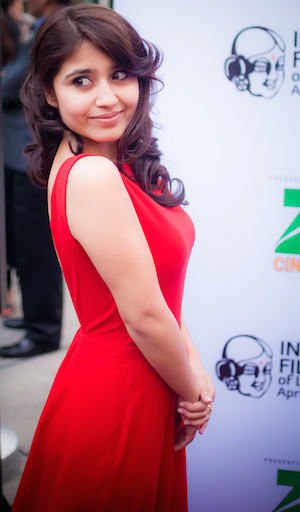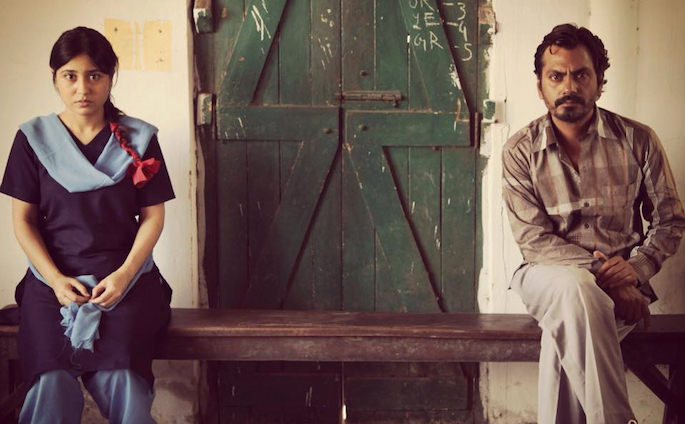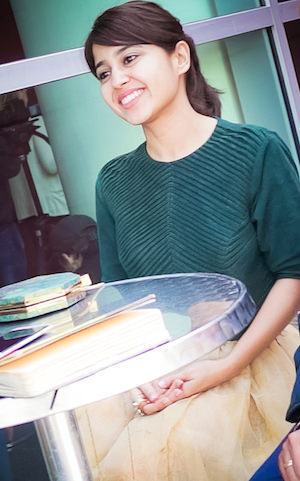
Armed with her radiant smile and earthy charm, Shweta Tripathi strikes you as a woman of substance.
At 27, she had no qualms about playing a 15-year-old girl having an affair with her school teacher in Haraamkhor, because she knew it was an important story to tell and it could resonate in any part of the world. She stars opposite an acting powerhouse like Nawazuddin Siddiqui, yet it is she who stays in your memory long after the credits roll.
It came as no surprise to anyone when this surefooted 29-year-old Delhi girl was named Best Actress at the Indian Film Festival, Los Angeles 2015 (shared with Kalki Koechlin for Margarita with a straw). We had all been won over as much by her outstanding performance, as her endearing “I’m just another girl” demeanor.
“I’d rather play this simple, small-town girl with all her complex emotions, than a hip teenager from Delhi in love with a boy. That would kill me!”
As she sat down to speak with us, it was easy to see her innate sense of style – hair pulled back, long beige tulle skirt matched with an emerald green top and minimal make-up. Petite and babyfaced, her teenage persona in the film couldn’t have been more convincing. We asked her what gave her the confidence to play a character so much younger than herself. “I don’t think Shlok gave me an option. It wasn’t whether I would be able to do the role, rather how were we going to pull it off. As for me, I’d rather play this simple, small-town girl with all her complex emotions, than a hip teenager from Delhi in love with a boy. That would kill me! But playing this 15-year-old small town girl, I could totally relate to her feelings and understanding of the world, even though personally I’ve never had a crush on a school teacher.”
To research for the role, Shweta and the filmmakers sought out women among their acquaintances, who had been through a similar life experience in their younger years. And they discovered that there was no dearth of such stories. “You’ll be surprised how many people you will find, when you start looking.”, she told us.

“These young girls often start to see the teacher as a father figure – as the ‘all-knowing’ person who can guide them, listen to them and take care of them.”
“Most of these girls were now in their late twenties-early thirties and they didn’t really want to revisit those memories because they weren’t pleasant. They were filled with regret. The common thread that tied them was that these young girls often start to see the teacher as a father figure – as the ‘all-knowing’ person who can guide them, listen to them and take care of them. They want to be around someone who they can respect and look up to. I’m sure the looks factor in somewhere as well, but it’s mostly about the feeling of being cared-for by this ideal person.”, she added. “None of these stories had a happy ending. Except one. That was a rare case where the teacher was unmarried and they were both musicians, so it worked out. Of course there was still a lot of drama between the families and that story could become another film.”
She admitted that the conversations were not easy. “It was discomforting and disturbing to bring it up with these women and have them open up about it. You can’t just keep poking someone about their past, especially if it’s hurtful.”

Despite having a dream launch to her acting career, she is firmly grounded and wants to stay true to her roots. “I’m lucky that my parents have always been very supportive. This subject is very sensitive, but they trusted me with it. And that trust between me and my family is as important to me as the the trust between actor-director and actor-actor. It helps me stay balanced. They know that I wouldn’t do things unnecessarily, that would make them uncomfortable or embarrassed.” Although not overly explicit, Shweta did have to do some scenes for the part which depict physical intimacy in the relationship. “My parents haven’t seen the film yet, and when I saw it myself on the opening night, I got a bit apprehensive about how they are going to take it now.”, she jokes.
About some of her conflicting emotions in the film and her own interpretation of those moments, she said, “there are a lot of subtleties in the film which are left open to audience interpretation. Like when she tells the teacher that she has missed her period. For all we know, she could be making it up. There are points in the film when she could be messing with his mind, just like he is messing with hers. So it’s not all black and white. Everyone in the film is a ‘haraamkhor’, according to Shlok”, she laughs.
Lifting the trophy on the closing night, in all her elegance, she beamed “This is my first film. This is my first festival. And this is my first award.” What could be more telling.
‘Haraamkhor’ is written and directed by Shlok Sharma and produced by Guneet Monga. It had its world premiere at IFFLA 2015 as the opening night gala film. Shweta Tripathi also played the lead role in the short film Safar (Journey), which won the Audience Choice Award for Best Short film.















